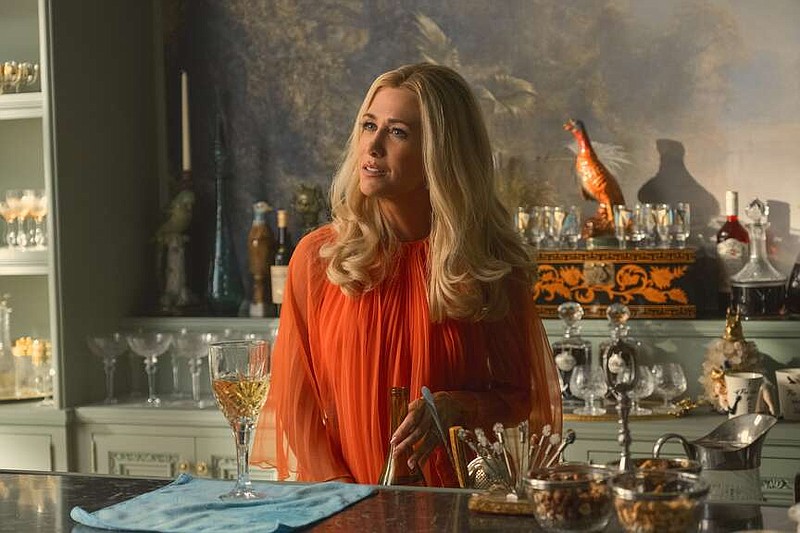I have not read Juliet McDaniel's 2018 novel "Mr. and Mrs. American Pie," which is nominally the basis of a new miniseries, "Palm Royale," but it's clear from the publisher's synopsis that it's a completely different story -- though one that someone decided could be rebuilt into diverting, even brilliant television. As indeed it has been.
Set in 1969 in the painfully upscale, excruciatingly exclusive community of Palm Beach, Fla., the series, streaming on Apple TV+, has been given the star treatment, in terms of production and talent. Created by Abe Sylvia ("George & Tammy"), with its first four episodes directed by Tate Taylor ("The Help"), it stars Kristen Wiig, Laura Dern (who originally developed the property), Allison Janney ("The West Wing"), Ricky Martin, Leslie Bibb ("American Housewife") and Carol Burnett, with a supporting cast that also includes Julia Duffy (you loved her on "Newhart"), Mindy Cohn (ditto, "Facts of Life"), Dern's father Bruce (screen royalty) and the great Paul Sand, 92, a frequent guest on Burnett's variety show half a century ago.
And so kudos to casting directors Kerry Barden and Paul Schnee, as well as to production designer Jon Carlos and costume designer Alix Friedberg, who rate a mention right at the top. They've created a world that is at once extravagant and stylistically acute, surrounding characters who are themselves exaggerated but -- for the most part -- this side of grotesque.
Wiig plays Maxine D'ellacourt Simmons, wife of airline pilot Douglas D'ellacourt Simmons (Josh Lucas), who would prefer to be known as Maxine D'ellacourt, a name that carries weight in Palm Beach. (Doug's aunt Norma, played by Burnett, a plastics and mouthwash heiress, ruled the town until an embolism put her in a coma; there is now a power vacuum.) Maxine, who believes in love and beauty, grew up an orphan in Tennessee, where somehow she became a regular reader of the Palm Beach Daily News, nicknamed the Shiny Sheet (the paper and the nickname are real), whose society pages formed her idea of glamour and what it would mean to be "somebody." The series is concerned with her attempts to make that happen.
Palm Royale is the beach club that epitomizes her dream; Maxine literally scales its walls. There she encounters a quartet whose names she knows as well as her own: Evelyn Rollins (Janney), "the self-appointed queen bee," as described in Maxine's introductory narration; Dinah Donahue (Bibb), "the ambassador's wife ... poised to dethrone Ms. Evelyn if her libido didn't get the better of her"; Mary Jones Davidsoul (Duffy), "the widow, who was as fizzy and dizzy as a glass of Champagne"; and Raquel Kimberly-Maco (Claudia Ferri), "the sugar heiress with $30 million to spare and a mobster husband."
"You're family to me," she tells them. They regard her as an annoying interloper, and she is quickly ushered from the grounds by Robert (Martin), the club bartender, who also happens to live in Norma's pool house. But that is just where the story begins.
Maxine has more successfully inserted herself into Norma's life, or at any rate into the room she occupies in a five-star nursing home, since Norma is unable to protest. That she expects that, as Norma's only living relative, Doug will inherit her millions is not a particularly good look; she has appointed herself her caretaker, even as she waits for Norma to die.
Social climbing is the subject of a great body of literature and film and films based on literature -- "Vanity Fair," "Gentlemen Prefer Blondes," "Purple Noon," "The Talented Mr. Ripley" (getting its own miniseries adaptation next month), "Six Degrees of Separation," "What Makes Sammy Run," "How to Succeed in Business Without Really Trying," "Room at the Top," it goes on. In some cases, the climbers triumph; in others, they're slapped back down.
All but the most overprivileged will understand that Maxine's dreams are misplaced, that she fundamentally misunderstands what constitutes a good life.
Burnett, 90, spends the early episodes comatose, but you don't hire Carol Burnett just to keep her a body in a bed, and she will emerge by stages, eyes first, as a formidable character, and the vessel of some of the series' funniest moments. Yet "Palm Royale" is above all Wiig's show, and she is terrific and genuine, alive in her role from moment to moment. It's a complex performance, funny and painful and endearing, shot through with hope and fear, sass and sadness; Wiig makes it impossible not to feel for Maxine, determined, in a great phrase "to maintain a posture of relentless positivity"; we root for her happiness more than for her success.
But even characters who in a lesser piece would be frozen into caricatures are granted some depth and fluidity, which helps sustain the series over 10 episodes. (Maxine's evolving relationship with Robert is especially important.)
Now, as to the ending. No spoilers here, but you might not want to read this paragraph until after you've watched for yourself. (It may be helpful to note -- and I mean actually make a note, so you'll remember -- some flash-forward narration at the beginning and end of the first episode.)

